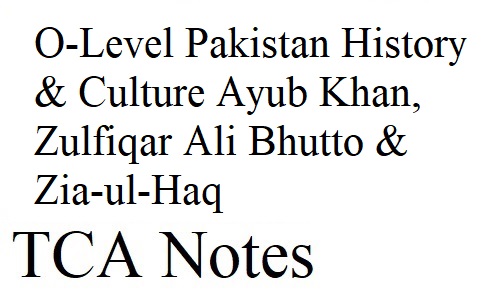O-Level Pakistan Studies P1 History and Culture of Pakistan Ayub Khan, Zulfiqar Ali Bhutto & Zia-ul-Haq
To view notes of Pakistan Studies Paper 1 History and Culture of Pakistan. Click Here.
Ayub Khan
He thought that army needs to rule now to restore stability to the country. He did not like the politicians because of their criticism of the army and general Ayub. East Pakistan was becoming rebellious so to put down their power and to start development in the country, Ayub Khan took over the rule.
Gave us the 1962 Constitution.
Introduced System of Basic Democracies.
Agricultural Reforms: Redistribution of lands for a better output. Big landowners were forced to find tenants. 3 major dams were built to aid agriculture. Loans to build wells were given. Ayub brought about the Green Revolution.
Industrial Reforms:
Loans from Western countries were taken. Oil refinery in 1962 and Mineral Development Corporation. RCD was signed for industrial and trade development. Export Bonus Scheme for exporting industries. However with the increase of Industry Pakistan became dependant on Foreign Aid.
Social and Economic Reforms:
New curriculum and textbooks. More schools were built. Laws were passed to benefit and help refugees and shelter less. Family Planning Programme. More Medical nursing training and training schools to increase the number of doctors and nurses.
New Capital:
Government moved from Karachi to Islamabad for more central area for administration far from the trade centre Karachi.
Zulfiqar Ali Bhutto
Simla Agreement:
Simla Accord to get the captured land and prisoners from India back from 1971 War.
The Islamic Summit Conference:
All Muslim leaders were invited to attend and discuss problems of Pakistan and other Muslim countries and how to solve them.
New Constitution:
A better and more democratic constitution.
Industrial Reforms:
Nationalization. Federal Ministry of Production was given a lot of Power to control Industrial Units.
Agricultural Reforms:
Land Ownership, reduced ceiling on land ownership. Land available for people to hold their own farms.
Security of Tenure:
Tenants rights were improved.
Education:
Nationalized all private sector schools. More schools were built.
Health and Social Reforms:
Rural Health Centres. Basic Health Units were built in urban areas. Training colleges for doctors and nurses were set up. Sale of Medicines under brand name was banned.
Administrative Reforms:
Re organized Civil Service. Removed unnecessary distinctions between types of civil workers. Created Federal Security Force (FSF).
The Nuclear Programme:
Bhutto started the Nuclear Bomb plan for Pakistan’ defence.
Zia-ul-Haq
Disbanded FSF (Federal Security Force)
Islamization:
His main policy. Shariat Court established. Fight against pagan communities during War against Russia. Hudood Ordinances. Zakat Ordinances. Zina Ordinance. Ushr Ordinance. Islamiyat studies made compulsory. Extra marks to candidates who were Hafiz in Civil Service Exams. Some part of Radio and news was to be in Arabic. Strict Punishments imposed under Islamic Laws.
Laws and government:
Passed Laws restricting power of courts. Civil Service was brought under military control. Military courts were established to try offenders according to martial law. Provincial Constitutional Order took away rights of court to challenge any political executive decision.
Industry:
Denationalization. Encouraged multinational countries to invest in Pakistan. Tried to improve quality of government based industries.
He started a strict policy of Islamization to show that that he was more Islamic and much better than Bhutto, who had a more liberal approach. Further more he wanted to give impression to the world that he had an Islamic government. He believed that a much strict and strong government can be set up on Islamic Principals.


